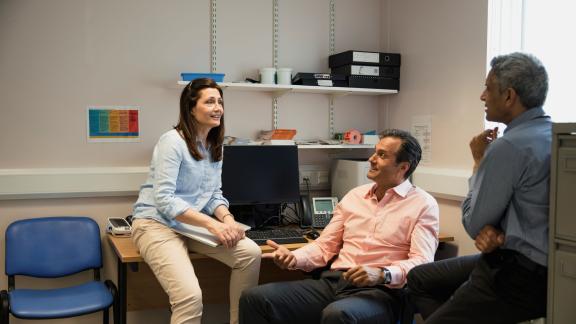Primary care federations and the COVID-19 vaccination programme

The COVID-19 vaccination programme has shown the best of the NHS. In particular, it has shown the best of the primary care sector, with all its component parts collaborating and working in new ways to step up to an enormous challenge.
Over 82 million vaccinations have been given over the course of eight months and the overwhelming majority have been delivered by primary care teams.
While the recognition of primary care, primary care networks (PCNs) and community pharmacists has been incredibly welcome, the role of primary care federations is not as widely understood.
More than 95 per cent said they worked in collaboration with other organisations to help deliver the programme.
Yet they have played a vital role. Over 85 per cent of federations surveyed by the NHS Confederation’s Primary Care Federation Network, which I chair, said that they have played a key role in delivering the COVID-19 vaccination programme in their area. Meanwhile more than 95 per cent said they worked in collaboration with other organisations to help deliver the programme.
Respondents to our survey are a just a fraction of the federations there are in England, but collectively they have delivered at least five million jabs so far – the true figure about the vital role of federations will be much, much greater.
The support federations have offered includes helping to set up vaccination centres at short notice, offering workplace support to PCNs and practices who have small teams, providing back office and infrastructure support and coordinating and delivering initiatives with public health teams to reach local communities.
More than vaccine support
Of course, primary care has delivered a huge amount more than simply vaccines and both federations have been directly involved in the vaccination programme, as well as those who haven’t, have told us how they have helped relieve pressures in other ways from their local PCNs and practices.
Many federations, including my own, have provided the teams that have cared for COVID-19-positive patients out of hospital in ‘hot hubs’, or responded quickly to create innovative new services such as Oximetry@home that allow people to monitor their own symptoms safely. Up and down the country they have worked hard to put additional GP and nurse capacity into the system both in and out of hours, to help practices and PCNs to support as many of their patients as possible while they cope with sickness and staff shortages.
As part of the wider primary care ecosystem, federations have more than proved their worth. As we look towards booster vaccines, flu campaigns and beyond, federations will be there again to support the wider system.
Looking forward
The kind of support federations can offer will be increasingly important as pressure again increases on primary care, and with the possibility of new direct enhanced service (DES) being introduced for PCNs from October. With federations’ support, PCNs could continue to play a part in the COVID-19 vaccination programme while getting on with business-as-usual demands and making important progress on population health management.
We could use established partnerships at all levels to deliver a coordinated programme, recruiting and training volunteers, reducing workload pressures on PCNs and practices, providing back-office support, or coordinating services such as ‘at home’ vaccination and pop-up vaccination clinics.
It has been clear too that the expertise and at-scale support federations can offer has been instrumental.
There will be new challenges too in finding novel ways to target cohorts for vaccination, including for boosters. And now that society has opened up post-‘Freedom Day’, federations, with their larger patient populations and infrastructure will be well placed to help.
Everyone involved in it knows the vaccination programme has been a huge undertaking which has stretched all parts of primary care. It has been clear too that the expertise and at-scale support federations can offer has been instrumental.
Now as we move into new territory, practices and PCNs need to know that they can find that support, and that policymakers make the most of the tools at their disposal by enabling federations to contribute.
Fiona Adamson is chair of the Primary Care Federation Network and chief executive of Hartlepool and Stockton Health GP Federation.



